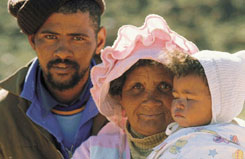Govt to provide food relief: Manuel
Shaun Benton
30 May 2008
The government is to provide relief for the country's poorest communities who are being hard hit by the global rise in food prices, with extra social spending to be accommodated for in the adjustments budget, Finance Minister Trevor Manuel said in his department's budget vote.
"This hardship is felt when families cannot stretch their income to cover even the most basic foodstuffs," he told members of Parliament in Cape Town this week.
Manuel said that South Africans were hurting from price instability, which was being driven largely by food price increases and the spiralling crude oil price, and that the government had prioritised short-term relief through the social grants system, school-feeding scheme and through transfers to welfare organisations.
To date, the Department of Social Development had already begun using the social relief of distress grant to provide those in need with short-term financial relief.
In the immediate term, Manuel said, the government relief would also extend to those poor who had been displaced by the recent xenophobic violence in the country.
"The financial implications of these measures will be accommodated in the adjustments budget and we are working with national and provincial government to ensure that the spending takes place as soon as possible so as to make a meaningful impact on those most affected," he said.
Global phenomenon
While the rising cost of food was a global phenomenon, Manuel said the government could not remain blind to the pain and hardship that poor people were experiencing.
His remarks came on the day that the United Nations' Food and Agriculture Organisation warned that the world was likely to continue to see higher food prices and expressed concern about biofuel policies.
Manuel pointed out that the price of maize had increased by 69% over the past two years, while the price of rice had increased by 131%, wheat by 71% and soybeans by 100%.
Most of these increases, he added, have occurred over the past six months, with rising oil also being a "significant contributor" to high food prices.
'Agflation'
With so-called "agflation" - inflation driven largely by food price increases - expected to become a common feature of globalising economies going forward, agricultural production now needed to become the central focus of the government's food security efforts over the medium to long-term.
Manuel said that the government's support for South Africa's agricultural sector as a whole needed to increase, with a particular focus on emerging farmers and resettled communities who had benefited from the land redistribution process.
"The National Treasury is working under the leadership of the Department of Agriculture to ensure that these short- and medium-term interventions are funded adequately and that these measures benefit the poor in the shortest possible period," he said.
Underlining the urgency with which he viewed the steep food and oil price increases, Manuel conceded that these factors are placing pressure on government's overall policy framework of inclusive economic growth.
"These price changes stress every sinew in our policy framework," he said, indicating that inflation targeting was not simply a policy but a framework, and suggesting that doing away with it was a luxury that the country could not afford.
Source: BuaNews












